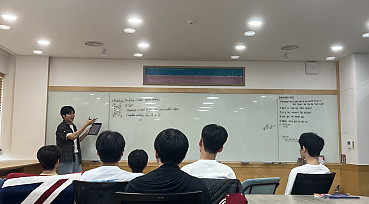콜로퀴움&세미나
-
2025 | 12.16
콜로퀴움Some recent progresses on Policy Iterations for Hamilton-Jacobi equations
Title:Some recent progresses on Policy Iterations …
-
2025 | 12.05
콜로퀴움Gradient length of Kähler–Einstein potentials and its applications
Title: Gradient length of Kähler–Einstein potentia…
-
2025 | 12.04
Probability Seminar
Title: Moments of Critical 2D Stochastic Heat Flow…
-
2025 | 11.28
콜로퀴움Lambda-invariant among KR-modules
Title: Lambda-invariant among KR-modulesAbstract: …
-
2025 | 11.21
콜로퀴움Algebraic moment polytopes of polarized spherical varieties
Title: Algebraic moment polytopes of polarized sph…
학술대회
-
2026 | 01.19~01.23
Korea PDE Winter School #12
Korea PDE Winter School #12개최 및 등록 안내일시: 2026년 1월 …
-
2025 | 02.24~02.28
IBS-CGP Workshop
<IBS-CGP Workshop>
-
2025 | 02.12
Workshop on Ergodic Theory and Related Fields
<Workshop on Ergodic Theory and Related Fields&…
-
2025 | 02.11
Workshop on Ergodic Theory and Related Fields
<Workshop on Ergodic Theory and Related Fields&…
-
2025 | 02.08~02.12
Workshop on Relative Langlands
<Schedule>-2025.02.0814:00~16:00Title:Anintr…
-
2025 | 02.04~02.08
The 20th ILJU School of Mathematics- Banach Spaces and Related Topics
Website:https://sites.google.com/view/2025ilju/
-
2025 | 01.13~01.17
POSTECH International Conference on Navier-Stokes Equations and Numerical Analysis on the Occasion of Professor Jae Ryong Kweon's Retirement
<POSTECH International Conference onNavier-Stok…
연구 하이라이트
MORE >수상소식
-
[이경석 교수] 포스텍 수학과 이경석 교수, 제17기 포스코사이언스펠로 선정
2025.10.24 -
[김진영 대학원생] POSTECH 수학과 '한국분자·세포생물학회 2025 정기학술대회 (KSMCB 2025)'에서 우수 포스터상 (Outstanding Poster Award) 수상
2025.10.17 -
[복진성 대학원생] 2024년 한국통계학회 동계학술논문발표회 대학원생 논문 발표상 수상
2025.01.17 -
[수학과 학부생 김민준, 김현성] 제 42회 수학경시대회 동상 수상
2024.12.05 -
[최선우 학생] 제 1회 포스텍 학부생 수학 연구논문상 수상
2024.11.11



























.png)











